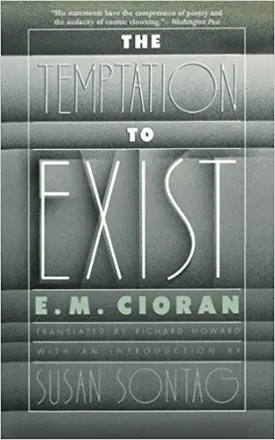The Temptation to Exist by E. M. Cioran
The Temptation to Exist by E. M. Cioran is a philosophical work that examines the human impulse to exist and offers insight into the philosophy of nihilism. In this work, Cioran invites his readers to consider the tension between man’s dualistic nature: his yearning for meaning and his drive for survival. He questions the true motivations for our existence and offers up a unique perspective on how one can transcend the trappings of normal subsistences.
Cioran begins by discussing the intellectual pull that exists between our need for meaning in life and our need for survival. He muses on the difficulty of finding purpose in an indifferent world and delves into the history of our species’ attempts to explain and control the chaos around us. He argues that attempting to build a rational framework to make sense of our existence only serves to amplify our irrationality.
This leads to a discussion of Cioran’s concept of nihilism. He posits that the philosophical necessity of nihilism is inescapable, explaining the pervasiveness of human suffering. He explains that ultimately, the nihilistic view of life offers an escape from the obsession with purpose. Cioran states that instead of attempting to search for a greater meaning, one should instead focus on embracing the chaos in life for it is in this chaos where one can find freedom from the trappings of modern existence.
The second part of The Temptation to Exist dives into Cioran’s interpretation of Nietzsche’s philosophical ideas. He reflects on Nietzsche’s concept of the Übermensch and the idea of the “death of God”. He explains that although nihilism can be liberating, it is only by embracing the self-created ideologies of the Übermensch that one can transcend the inherent nihilism of modernity. This further adds to Cioran’s argument that individuals must strive to break away from the need to attach meaning to life and instead focus on creating their own ideals.
The book closes by discussing the “temptation to exist”: the inner conflict one experiences between existential chaos and the desire for purpose. Here, Cioran argues that ultimately, existence serves no essential purpose. He advocates for a life of selfless contemplation of the universe, free from the desire to subjugate chaos through meaning. He claims this resolution can be achieved by living life in harmony with the chaos of existence, understanding the ephemerality of one’s presence in the universe and learning to accept the ultimate human paradox of life: that to exist is to suffer.
Overall, The Temptation to Exist is an intricate and thought-provoking philosophical work that touches upon some of humanity’s fundamental questions about existence. Cioran’s attempts to reconcile nihilism and the human need for meaning provides readers with an interesting interpretation of Nietzsche’s work, while also exploring the tension between life’s ultimate purposelessness and our own struggles with the chaos of existence. His musings on the human condition and his reflections on the nature of modernity provide valuable insight into the philosophical principles of nihilism. It is an essential read for anyone who is interested in exploring the complexities of human existence.

